- Home
- Muriel Spark
The Hothouse by the East River Page 5
The Hothouse by the East River Read online
Page 5
‘Why French?’ says Garven.
‘Elsa,’ says Paul. ‘You’re going too far.’
‘I’m not up in French,’ says Garven.
‘Mr Hazlett wants you to quit, Garven. If we speak French will you quit?’
‘No,’ says Garven.
‘You see?’ Elsa says, swaying ostentatiously from the window to the sofa, her shadow waving with her. ‘You see? He’s got future plans for his thesis and his career.’
‘When I’m through with this job I’ll let you know,’ says Garven, disappearing, so that only his footsteps can be heard receding along the hall towards the kitchen. Presently comes the clink of ice.
‘Poor fellow!’ says Paul.
The telephone rings.
‘That’s Pierre,’ says his mother. ‘I know his ring. Answer it.’
‘Hallo,’ says Paul into the receiver.
‘Is everything all right?’ says Pierre’s voice.
‘What do you mean, “Is everything all right ?“ ‘says Paul, looking at Elsa while he repeats his son’s question, as it may be for her to hear.
‘Is it a good day or a bad day?’
‘What do you mean, “Is it a good day or a bad day?”‘
‘Tell him it’s a good day,’ says Elsa. ‘He means me. Tell him it’s one of my good days. Come along, tell him.’
But Paul’s attention is meanwhile eared to the voice at the other end and his free hand stretches forth with a helpless flutter to hush Elsa’s talk, like the hand of that King Canute who forbade the sea to advance in order merely to illustrate the futility of the attempt.
‘I can’t hear what you say,’ says Paul into the mouthpiece. ‘Your mother’s talking. I can’t stand this house any more, this Garven. Are you at home now? I’ll be right over.’
‘Back in 1944 when people were normal and there was a world war on,’ says Paul to his son, ‘it was a serious thing to be a spy. Very serious indeed.’
‘Was it?’ says Pierre. ‘Do you hear that, Peregrine?’ he says, addressing his friend who sits shapelessly on the sofa blinking his pinkish eyes, and drinking whisky and soda from a tall fluted glass. ‘Father says,’ says Pierre, ‘that it was a serious thing to be a spy back in the old days.’
Paul says to his son’s guest, ‘I was instrumental in sending a spy to prison. He was a German, a very dangerous, wild personality. Of course, he was a double agent. Then he got wounded while trying to escape from his prison. He was shot. A few months later we heard that he died of the wounds. But that was a ruse. He didn’t die at all. Somebody else must have been substituted for him. I know, because I’ve seen him in New York.’
Peregrine shifts his eyes to tall young Pierre who is tipping tonic water into his gin with a disdainful backward motion of the wrist and haughty lowered lids, gestures that do not, however, signify anything special. ‘Is that the guy you just went to check up on in the German prison?’ Peregrine says to his friend.
‘It is,’ says Pierre.
Paul looks at the two young men and his thoughts turn panicky: ‘This has all happened a long time ago,’ he thinks. ‘What is now? Now is never, never. Only then exists. Where shall I turn next? New York is changing. Help me! Help me!’ He says, ‘It was a fruitless journey, Pierre.’
‘Oh, I wouldn’t say that,’ Pierre says. ‘The truth is always fruitful.’
‘The truth, yes,’ says the father. ‘But you failed to find the truth. The records have been falsified. Kiel is here in New York and he’s after me. They always get their revenge.’
Peregrine sips his drink and then turns the glass this way and that, as if he too feels that all this palaver has occurred many times before, many times, like the new spring today blowing in on Manhattan from Long Island Sound, making the dust dance on the pavements.
‘About this show that Pierre and I are planning to put on at the Very Much Club,’ he says, ‘we don’t have a lot of time to get started if we want the spring audiences; May, June at the latest. But we can’t fail, Mr Hazlett, that’s for sure. It’s right for the spring.’
But Paul is still in the compound of Intelligence buildings in the spring of 1944. He is twenty-eight. Paul has been back and forward to England since his late school-days, having been sent from Montenegro to his father’s English relatives. He studied in Paris, then London. ‘His intellect has a hundred eyes,’ his mother wrote to her friends. In fact he has made his way quite well, starting on foreign broadcasts for the B.B.C. Then, since it had come round to wartime, he was sent to the Compound, a secret government department which specialised in propaganda broadcasts to Europe.
‘I’m not ambitious,’ he says to Elsa when he has fallen in love with her. ‘Not an ambitious man at all.’ He says this in self-commendation; what he really means is that he is afraid he will not be successful in achieving any ambitions. She is not interested one way or another in his ambitions, being attracted to him in any case more and more, day after day. If he should say he is ambitious for anything whatsoever the word would not mean anything to her. She is twenty-three, and at this time does not cast a shadow at the least angle different from anybody else’s within her range of visible light; sunlight and artificial light act on Elsa as they do on everyone else.
The norm in the air about Elsa and Paul is the war with Germany.
At times, when she is not on late duty, Elsa takes the German prisoners for walks in the country within a five-mile radius of the Compound. For various reasons these men, having been taken prisoners of war, have chosen to leave their camps and work for their enemy. What they are engaged with in this particular Compound is known as black propaganda and psychological warfare. This is the propagation of the Allied point of view under the guise of the German point of view; it involves a tangled mixture of damaging lies, flattering and plausible truths.
‘I think you’re out of your element,’ says Miles Bunting to Elsa. He is a lanky man with a twisted smile, reputed to be the most intelligent member of the Compound. The Compound is reputed to be the most intelligent outfit of the war. The source from which these reputations have arisen will never be found.
‘I think you’re out of your mind,’ she says.
‘Our war effort here is extremely valuable,’ he says.
‘Valuable to yourselves,’ says she.
‘No, to the country,’ he says. And he adds, ‘We have means of testing the results. These are things you don’t know a thing about.’
She has said the place is ridiculous. Deep in the heart of it, she is nevertheless deprived of any insight into its doing. It is the policy of the little organisation to tell the workers only what they need to know to perform their individual functions.
Miles Bunting says again, ‘You’re out of your element.’
‘And you, your mind,’ she says.
It is true she is out of her element; for one thing she is the only member of the Compound who does not know German. And in a sense it is true he is out of his mind for indulging a desire to confide in her, with hints and references to which she cannot possibly attach a meaning, as if she were a member of the inner circle at the Compound. He had simply overlooked her limited knowledge, drawn by her extreme attractiveness.
Among the women in the house where she is billeted is large Princess Xavier who has already met Paul in London. ‘Poppy,’ says Elsa, ‘would you marry Paul if you were me?’
‘I’m not ambitious,’ Paul says to Elsa when he has fallen in love with her. ‘Not ambitious at all.’
He takes Elsa to London on their fortnightly leave, which they arrange to coincide. They have stayed first at a borrowed flat in Clarges Street, then at the Strand Palace Hotel which is less comfortable since they have to produce their identification cards and ration books, each bearing different names, so that they are obliged to creep in and out of one or the other single rooms early in the morning, and to tip the floor-page heavily.
Elsa’s main job at the Compound consists of taking messages and reports from military intell
igence personnel on a special green telephone used everywhere during the war for secret communications. It is known as a scrambler, because the connection is heavily jammed with jangling caterwauls to protect the conversation against eavesdropping; this harrowing noise all but prevents the speakers from hearing each other, but once the knack is mastered it is easy to hear the voice at the other end giving such information as flight details from newly-returned bomber missions, the numbers sent, the numbers lost, the numbers of enemy planes felled. Numbers and numbers over Germany and France. Cities and factories. Pinpoints and numbers piercing the scrambler.
And sometimes in the afternoons she takes the Germans for walks within the five-mile radius of the Compound that is allowed to them. Perhaps it is because she speaks no German that these men tend to say more to her in English than they would do in their own language. It is a common misunderstanding that one who does not know another’s mother tongue is assumed to be less intelligent and discerning than he is. In this way, most of the handful of the German prisoners whom Elsa takes for country walks underestimate her wits.
Besides which, they are mostly edgy; whatever the degree of conviction that has led them to work for the enemy, there remains a nagging knowledge that they have deserted their native forces. Only two amongst them are entirely at ease with themselves: a young dedicated communist and an Austrian count.
And so, before Paul arrives at the Compound and about the time that Miles Bunting is starting loftily to put her at odds, she occupies her bored afternoons by taking them for walks, one by one.
They are walking along the edge of a wood. Rudi is a flat-faced man in his early twenties. He walks with a curious wading motion, with Elsa by his side keeping solemn time while blankly noting him within herself, placing him on record with her indwelling dæmon. He is gloomy today. The men he is billeted with, the other prisoners of war, who are working for the British, are getting on his nerves. He says they had a fight the night before; it all started with one accusing another of leaving a rim round the edge of the bath. He says that anyhow, he is sure to be shot before long. D-Day is coming up, he says. And he waves his hands towards the thick woods to their left and tells her that Hitler’s parachutists will soon be filling these woods. He speaks with a sort of bitter, convinced pride like a Judas foretelling hell-fires awaiting him as a boastful proof of his betrayed master’s divinity. Elsa tells him to cheer up. She reminds him that only last week he was bubbling with joy to think that the war would soon be over, and he could go down to the beach with his friends at home as he had done before. But he wades on gazing down at the path, depressed. ‘My family will find that I’ve been working for the British. Here, we have lard to eat. They have no lard in Germany today. They will say I have done it for lard. They will never have me back.’ She says, ‘Oh, you’re very erratic.’
‘Erotic?’ He brightens with the word, smiling towards her. ‘Erratic,’ she repeats. He stops and takes his little dictionary from the inside pocket of his saggy tweed jacket and gravely looks up the word.
They are walking along the edge of the wood. This time it is another of the band, Heinz the communist, small and tough, the survivor of a captured U-boat who shakes hands with himself continually for his decision to work against Hitler and who looks with breezy energy to the inevitable defeat of Germany when he hopes to take up his peacetime job as a waiter in London instead of Hamburg. Heinz the communist and Erich the count are her favourite walking-partners. Some afternoons they walk all three together. The two men practise their English on Elsa. The path by the edge of the wood is narrow, for the fields have been furrowed right to the verge because of the wartime need for crops to grow on as many lengths and patches of earth as possible.
They walk through the woods now, these three, talking of their past as if they were middle-aged and not all in their young twenties. The war has given them a past. It will never be the same afterwards. They none of them want it so. Heinz speaks cheerfully of his boyhood in the cold alleys of Berlin. Erich glimpses a rabbit before it bobs into its hole. ‘If I had a gun I would have shot him for supper,’ he says. ‘As a boy I shot rabbits.’
‘I stole rabbits,’ says Heinz, and goes on to recount, in English that becomes more curiously constructed as his story develops, how adept he was as a boy at slipping dead rabbits off their hooks, where they hung at the doors of big butchers’ shops, then bearing them to an alley butcher’s where he obtained a very small but precious price for them. So they talk of their past, Heinz with his alley-wits in the hungry back streets, his gang battles with the Hitler Youth and his training as a radio operator in the navy in the early days of the war, gives out his past in a series of pictures, distinct, primitive, undisdainful, without hope, without pain, without any comment but the grin and laugh of a constitutional survivor, who has, and always will have, plans for the future.
Erich, whose home is a castle among the mountains of Southern Austria, now occupied by the military, does not seem to care much that it once contained his past life. This past of his still clings about his young personality in bits, as late leaves droop singly from a winter tree; he has shaken off most of it. He was married shortly before the war. It was not a love match. ‘But,’ he has once said, ‘if I find they have killed my wife I shall of course shoot myself.’ He trudges through the woods with Heinz and Elsa, identifying birds by their calls, naming ferns, examining burrows in the earth and catkins on the trees, about all of which he is explicitly knowledgeable. They trudge through last year’s leaves under the spring foliage and speculate as everyone else is doing about the forthcoming D-Day, whether the Allies will attack from North Africa, from Norway, or from the Channel. Elsa, too, has brought her past life with her and shares it as casually as she shares the sandwiches of bread, margarine and bits of cold bacon whenever she can scrape these items together from her allotted rations. She brings with her scraps of her life in a family of poor relations in a semi-detached house in Sevenoaks, a tumble-down education at a boarding school where she played lacrosse and the piano. The three laugh often, for they think of things to laugh about and offer them round, one by one, until it is time to return to the village and wait for the official bus at four o’clock which will carry them to the Compound for their work. The villagers stare at them with contempt, not knowing in the least what is going on, but knowing only that their countryside is peppered with Germans and that somehow the authorities permit it.
Only once Elsa and one of her German companions are arrested. A policeman new to these parts hears the foreign accent and demands their identity cards; he is not in the least satisfied. Elsa and her German quietly accept his invitation to the police station. It is a still, sunny afternoon. The sergeant on duty is vaguely aware that foreigners are locally engaged on secret work, but he is taking no chances. Elsa gives a telephone number and the sergeant disappears. She sits quietly with her companion, a middle-aged philosopher from Dresden. They sit for a while under the eyes of the policeman who has brought them in. Then the German starts to protest. He is indignant. His nerves have had enough of policemen, and he has not taken the step of joining with the British in order to find himself once more in the hands of any police whatsoever. ‘It’s all right,’ Elsa keeps saying. ‘Don’t worry.’ The sergeant returns, this time rather embarrassed but still not disposed to commit himself to an apology. The young policeman stands guard by the door while the sergeant goes behind a counter and starts writing in a ledger-like book with raised eyebrows to betoken nonchalance. ‘To be treated like a pissing schoolboy!’ says the German professor. The sergeant writes on, the policeman stands on, and Elsa continues to reassure her companion: ‘They’ll come and rescue us in a minute or two.’ The security officer at the Compound turns up by car within twenty minutes, accompanied by the Chief Constable of the County, formally recognises Elsa and the prisoner, and whizzes them off in the car while the sergeant is still saying, ‘We can’t take any chances you know.’ The security officer mutters all the way to the Compoun
d about what a raspberry the police are going to get because of this, a raspberry in these days being already an outdated expression meaning a reprimand. A man less set in his limited ways than the security officer would call it a rocket in this English spring of 1944 when rocket missiles are leaping on London and the word is one of such that you either have to bandy it about as a euphemism or sit down, weep and give up.
They are walking along the path at the edge of the wood. Helmut has newly arrived at the Compound. He is called simply Kiel, where Claus Kiel is always known as Claus. Not that either name is the man’s own; but both at the beginning, after they secretly volunteered for separate batches of the German prisoners of war, and were tested, and vetted, and eavesdropped upon for months on end, opted for the cover name of Kiel. Claus Kiel is a gentle ill-favoured boy with puny limbs all at odds with each other, pale, thin and nervous, with a vague and tentative leaning towards artistic appreciation. In any other fighting nation but Nazi Germany he would have been rejected for military service, and this is plainly why, when the opportunity arose, he took refuge with the British cause, lest he should be sent back to Germany when one of the periodic exchanges of prisoners should take place, and so be obliged to engage once more in the physical nightmare of combat.
Helmut Kiel is a different concept altogether.
According to Allied information gathered in the course of the months preceding his acceptance for British secret service, he was the wild bad boy of his German training unit.
Helmut Kiel joined the defectors’ Compound a few weeks before Paul Hazlett. They have a fight. It starts with an argument over their work, something trivial. The real cause is Elsa. They knock each other about in a field behind the Compound. Not Kiel, but Paul is rebuked, on the grounds that Paul has the unfair advantage over Kiel in that he is not a prisoner of war. The affair is passed off as one of those explosions of nerves that occur in the Compound and in the billets.
In the house where Elsa is quartered she is in trouble. The room she occupies is large enough for two beds, but she has refused to share the room with another girl. The elderly women who administer these affairs send for her to come to them in their bottle-green office in London. Greying print dresses hang over their drooping figures. They hunch over their desks. One of them tells her, ‘It’s the regulations that girls under thirty have to share a room. Only women of thirty and more are entitled to a room to themselves.’

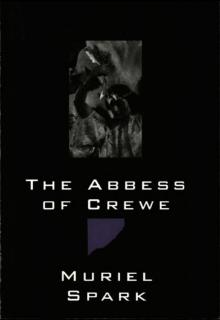 The Abbess of Crewe: A Modern Morality Tale
The Abbess of Crewe: A Modern Morality Tale Reality and Dreams
Reality and Dreams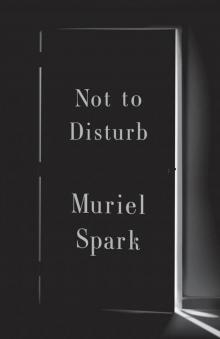 Not to Disturb
Not to Disturb The Prime of Miss Jean Brodie
The Prime of Miss Jean Brodie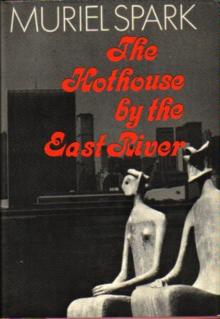 The Hothouse by the East River
The Hothouse by the East River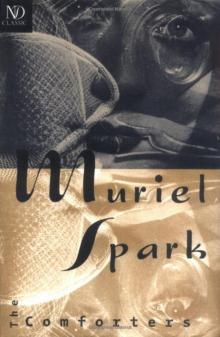 The Comforters
The Comforters (1958) Robinson
(1958) Robinson Unknown
Unknown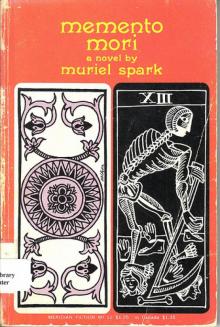 Memento Mori
Memento Mori The Finishing School
The Finishing School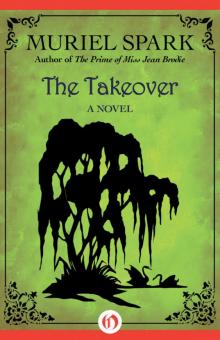 The Takeover
The Takeover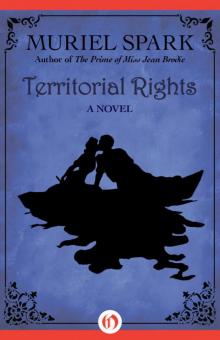 Territorial Rights
Territorial Rights The Complete Short Stories
The Complete Short Stories The Golden Fleece: Essays
The Golden Fleece: Essays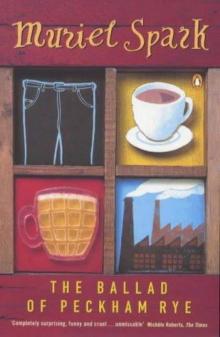 The Ballad of Peckham Rye
The Ballad of Peckham Rye Doctors of Philosophy: A Play
Doctors of Philosophy: A Play The Mandelbaum Gate
The Mandelbaum Gate Loitering With Intent
Loitering With Intent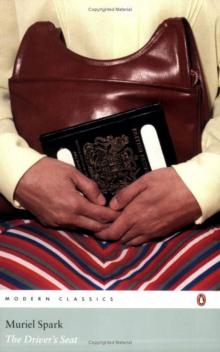 The Driver's Seat
The Driver's Seat Complete Poems: Muriel Spark
Complete Poems: Muriel Spark Symposium
Symposium Aiding and Abetting
Aiding and Abetting The Golden Fleece
The Golden Fleece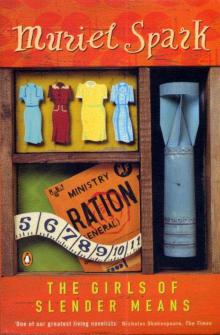 The Girls of Slender Means
The Girls of Slender Means Alice Long’s Dachshunds
Alice Long’s Dachshunds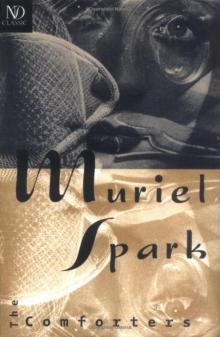 (1954) The Comforters
(1954) The Comforters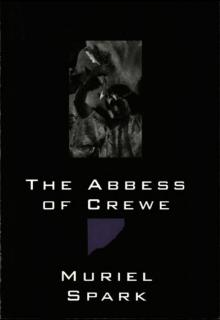 The Abbess of Crewe
The Abbess of Crewe Curriculum Vitae
Curriculum Vitae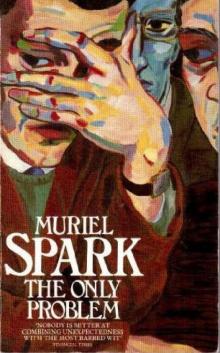 The Only Problem
The Only Problem Doctors of Philosophy
Doctors of Philosophy